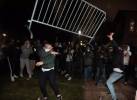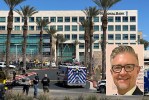HOSA trains students for careers in health care
Tazia Statucki wants nothing more than to some day make medical history.
The 17-year-old senior at Southwest Career and Technical Academy in Las Vegas says she has known since she was a little girl that she is destined for a career in medicine.
"I just love being able to help people," she says.
The desire to assist others, she claims, is also what interested her in joining Health Occupations Students of America.
According to its website, hosa.org, the national organization's mission is "to enhance the delivery of compassionate, quality health care by providing opportunities for knowledge, skill and leadership development of all health science technology education students, therefore helping students to meet the needs of the health care community."
HOSA boasts upwards of 120,000 members in its more than 3,200 high school, postsecondary and collegiate chapters throughout the country. Nevada is home to 29 chapters, 10 of them in Clark County.
Statucki is HOSA's Nevada state president. Her duties include presiding over the organization's five-person state officer team and 900 members. She also represents Nevada at HOSA's annual state and national leadership conferences, among other activities. Last month, Statucki traveled to Washington, D.C., where she and other HOSA leaders visited lawmakers on Capitol Hill to promote health care.
At school, the teen is studying dental assisting through Southwest CTA's Professional Service Academy program, which offers courses that simulate real-world, on-the-job experiences to prepare students to enter the workforce, postsecondary job training or continue on to college.
Dressed in her official HOSA uniform -- a white blouse, paired with a dark skirt and blazer adorned with a badge bearing her name and title -- Statucki explains, "My family has been affected by diabetes," and notes that HOSA has selected the Juvenile Diabetes Research Foundation for its national service project this year.
Researchers are "working towards a cure" for the disease, she says, but is confident that "I can be the one to do it."
HOSA membership is open to any high school or postsecondary student (regardless of age) who displays "an interest in the health care field," explains Randi Hunewill, state HOSA adviser for the Nevada Department of Education.
Nevada has seen the largest increase in HOSA chapters than any other state during the past two years. Most recently, a pair of chapters was formed at Western High School and Valley High School.
The organization provides members "not only with leadership opportunities," Hunewill says, but also "the hands-on skills that they need to be successful (when) either going directly into the (health care) field or going on to postsecondary" education.
That's good news, since Nevada was ranked 47th in the nation for overall health in 2010 by the United Health Foundation and landed in 46th place in terms of primary-care physicians per every 100,000 people.
"So, we need people going into those fields," Hunewill says.
Vicki Smith agrees. A former longtime respiratory therapist-turned-educator, she helped found Nevada's first official HOSA chapter in 2007 while teaching at Rancho High School's Medical Academy magnet program.
She now teaches at Southwest CTA, where she has served as the HOSA adviser since introducing the organization at the campus three years ago.
"Nevada is behind every other state in advancement" in the medical field, Smith contends. Involvement with HOSA may prompt students to "go on to postsecondary (training) and find something that they really love by doing it."
Through HOSA, members are exposed to hundreds of health care and related career paths via guest speakers, special training events, community service projects and leadership conferences. There, they compete against other members in dozens of categories ranging from medical photography and extemporaneous speaking to community emergency response team (CERT) and first aid/rescue breathing skills.
The competitions "actually allow them to go out and practice these skills" they have learned through their work with the organization, Hunewill explains.
Students who place first, second or third at state-level conferences are eligible to compete at HOSA's annual National Leadership Conference.
Smith has been known to bring other chapter members to nationals as well, "because I feel like the leadership skills (taught there) will carry on into life and I want to give my kids an excellent foundation."
Southwest CTA senior Camille Maniago won a first-place gold medal last spring at the Nevada State Leadership Conference for the work she did publishing her HOSA chapter's newsletter.
Health care is in Maniago's blood: Her physician father formerly owned a clinic in the Philippines, where she spent countless hours as a child watching him treat patients.
"With HOSA, I didn't realize I would learn so much about other health professions," says the teen, who is studying respiratory therapy at Southwest CTA. "It was a great introduction to everything, and it gave me a general idea of what I want to do in my life. We had actual doctors come in and I didn't realize what they had to go through to be in that profession."
Also at the spring state conference, senior Raina Benford placed second and took home a silver medal in the job-seeking skills category.
Unlike many of her peers who say they hope to some day practice pediatrics, 17-year-old Benford claims she's looking forward to a career in gerontology. "I just love old people," she says with a broad smile.
"I chose HOSA because I wanted to get a better feel for health care. I've learned a lot about getting a job and going out in the health care field," she explains. Attending HOSA meetings at Southwest CTA is "one of my favorite parts of the week. I love getting other people excited about health care, too."
Smith says two of her former students and HOSA members are currently organizing a chapter at the University of Nevada, Reno; another is forming a local chapter at the College of Southern Nevada.
Yet another of her students, Rancho High School graduate Sean Sheffer, has served as HOSA'S national president since 2010.
He frequently travels around the country acting as the organization's ambassador, promoting HOSA at national health care events and overseeing its annual leadership conference, among other duties.
Sheffer says his involvement with HOSA has been a "critical, life-changing" experience.
"You actually get to step out and see what the medical field and the health profession is all about. You get to dress in scrubs if you want to be a CNF (clinical nurse specialist), and there are competitions that reflect how the industry is and you're competing in them, and you're expected to know how to best practice general nursing skills, whether it be at the bedside with the patient, or washing your hands," he explains. "They try to mirror the actual health field before you go into it."
He suspects HOSA probably enlightened many young people about the nation's health care crisis.
"It makes us aware of what are the shortcomings of the health care system right now," 19-year-old Sheffer says, and "know that there's all this chaos going on in terms of legislation and trying to solve how it's going to work in the future. At least you're aware that there are problems, so that later on you are prepared to tackle them with your solutions."
Sheffer is pursuing dual nursing and business degrees through a special health care management program at Ivy League schools the University of Pennsylvania and the Wharton School of Business. He says his dream is to eventually become chief executive officer at a hospital, possibly in Las Vegas.
"I really do want to come home and see if I can reflect some of the positive practices" happening at medical facilities elsewhere "into the hospitals in Las Vegas," he explains, and "join the team of other professionals there who are trying to improve systems and work with them."
Smith says Sheffer is a shining example of what happens when teens are exposed to what she calls the "oohs and aahs" of health care through HOSA. As a chapter adviser, "What I can do is excite them about going on" to build a career in the industry.
She keeps the 120-plus members of her HOSA chapter busy throughout the school year with various community volunteer and fundraising events.
Besides its efforts raising funds for the Juvenile Diabetes Research Foundation, the chapter also works with Ronald McDonald House Charities of Greater Las Vegas, cooking and serving meals to families who stay there while their ailing children receive medical treatment.
Meanwhile, Southwest CTA HOSA members held a fundraiser last year benefiting the local Shade Tree Shelter for women and children.
Nationally, Smith says, "We've been going through this phase where people don't volunteer like they used to. What HOSA will do is teach (members) what they need to do to volunteer."
She also encourages teens to lend a hand at area hospitals "and learn a little bit more about health care" while giving back to the community.
On Saturday, the chapter hosted a "community fair" event, featuring various food and merchandise vendors, in Southwest CTA's parking lot to help raise funds to cover costs for its members to attend HOSA's State Leadership Conference, to be held in March in Las Vegas, and the National Leadership Conference, scheduled for June in Orlando.
Smith says she's hopeful her students will "wipe out" the competition from other Nevada chapters at the 2012 state conference -- especially in CERT events.
Her students have recently undergone intensive training under Smith, who is herself a member of a CERT team, and the Las Vegas Fire and Rescue department. The teens trained in triage, light search-and-rescue maneuvers and disaster management skills.
They will eventually be assigned to cover buildings at Southwest CTA. If an emergency were ever to arise on campus, "They'd grab their (equipment) bags and we'd go report to those buildings," Smith explains, "and then everyone who's in the building could get care right there."
Smith will break new ground again this year when she and her students establish a Medical Reserve Corps HOSA unit at the school.
Nationally, MRC is sponsored by the Office of the Surgeon General and is comprised of medical, public health and other volunteers who assist during emergencies and natural disasters.
"With MRC, what we want (to teach) people to do is be prepared in their own homes," Smith says, explaining that her students will soon begin making and selling various types of emergency preparedness kits, as well as developing emergency instructions that families can use in their homes. "Education is our first goal."
Southwest CTA senior and former HOSA chapter president Marclem Hernandez spent two years researching the MRC program and approached Smith about bringing it to campus. He has been charged with organizing the unit to get it up and running in the coming months.
"I want to leave something for the school, for them to build on" after he graduates next year, he explains of his motivation to found the unit.
"(Participation in HOSA) will help you be more responsible," 18-year-old Hernandez says, "not just for yourself but for other people, too, and that's what the medical field is all about."
"It's a very rewarding profession," agrees his classmate, Statucki.
"HOSA is for everybody," she contends. "It's for the high school students who say, 'I don't know what I want to do.' But it's also for the alumni members who get to connect and for the professionals who want to get involved and help mentor younger kids. It's really for everyone in the community."
Even if not all of her HOSA chapter members go on to pursue careers in the medical field, Smith takes solace in knowing that the training and exposure they received will make them "connoisseurs of health care."
"They'll know how to go to good physicians, (and recognize) what's not good; how to seek out second opinions," she assures, "because they'll have the understanding and backing of what is needed in health care."






















